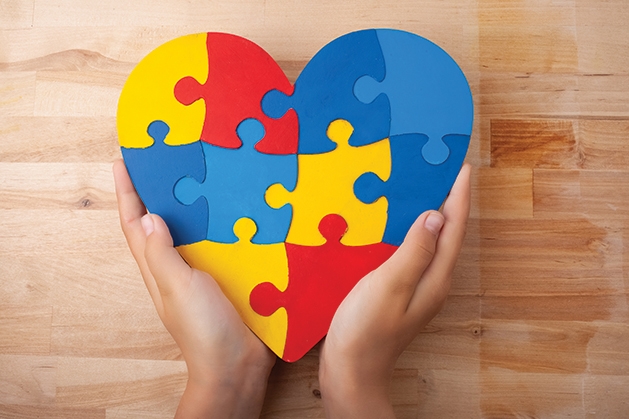
April 2 marks World Autism Awareness Day. The entire month is known as National Autism Awareness month and works to spread awareness, promote acceptance and ignite change, according to the Autism Society.
“We spend all day, every day of the year, working with families and children on the autism spectrum,” says Tony Thomann, director of strategy and innovation at the Minnesota Autism Center (MAC). “But National Autism Awareness Month in April is good for people to understand that there are real people dealing with these challenges.”
For families with an autistic child, they’re far from alone. The Centers for Disease Control and Prevention (CDC) estimates that one in 44 children in Minnesota has been diagnosed to be on the autism spectrum disorder (ASD).
MAC, headquartered in Minnetonka with sites around the state, provides support and therapy for individuals diagnosed with ASD. Its programs focus on those from 18 months to 21 years old, where the center works diligently to provide individualized support for children and families. “Our therapy’s goals usually focus on one of two outcomes—preparing a child to be able to go to school and have success or preparing them with independent living skills,” Thomann says.
“Our intake specialist and clinical team will work through an assessment to help determine what the appropriate services are for the family and their child,” Thomann says.
The center offers several therapy options, including occupational therapy, speech therapy and applied behavior analysis, which helps teach everyday life skills, such as using language to express emotion and navigating social situations.
For Angel Thao and her family (husband, Chris; 1-year-old Nivora; and 8-year-old Veyera), MAC has been life changing. “Veyera was medically diagnosed with ASD at 3 years old [and also] Sensory Processing Disorder,” Thao says. “She is still entirely nonverbal [and] utilizes a speech tablet to communicate, and she knows a few sign language gestures.”
Thao’s family has been with MAC for two years, and Veyera engages in several types of therapies, centered around applied behavior analysis and positive behavior interventions and support.
MAC supports youth with ASD and also works with families. “We work to help them understand how autism is impacting their child,” Thomann says. “By [having family members] understand, we put them in a better place to help their child reach their full potential.”
Thomann says that early intervention is key. “While receiving a diagnosis of autism can be scary, knowing early and having a team of people on your side makes a big difference,” he says.
“Without MAC, Veyera would not have met as many milestones today,” Thao says.
“With any individual with special needs, there will be many difficult times and experiences,” Thao says. “But it is also significantly rewarding. Veyera brings so much joy, peace, love and kindness in our lives … And though she may be completely non-verbal, if you listen closely, you can hear her speak through her heart.”









